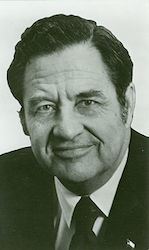 One of my fondest childhood memories was of Congressman J.J. “Jake” Pickle lighting up the First Methodist Church downtown when he’d enter, bigger than life, wearing a top hat and passing around those tiny, goofy green plastic pickles.
One of my fondest childhood memories was of Congressman J.J. “Jake” Pickle lighting up the First Methodist Church downtown when he’d enter, bigger than life, wearing a top hat and passing around those tiny, goofy green plastic pickles.
All the kids loved Jake because he made us laugh and paid attention to us. As we grew up, residents of the former Tenth Congressional District loved Jake because he made us laugh and paid attention to us, during all the decades of his long and significant life.
Like his illustrious congressional predecessors — James Buchanan (1913 to 1937), Lyndon Johnson (1937 to 1949) and Homer Thornberry (1949 to 1963) — Jake (serving from 1963 to 1995) was unencumbered by e-mail and thick layers of staff between him and his constituents. He was a hands-on representative and loved every minute of it. He felt it a high calling and privilege to be in a position to help people.
In 1967, fearing for the life of my favorite University of Texas Spanish professor who was unjustly detained in Chile for political reasons, I wrote to Congressman Pickle. Jake answered me with a hand-written letter, misspelling the country as “Chili.”
He didn’t know my professor, but he trusted me, a constituent barely old enough to vote, and saw to her safe return to Austin. Like me, many thousands of Austinites have stories to tell of how Jake personally helped them.
Humor was ingrained into his genetic coding. When studying policy development under former Congresswoman Barbara Jordan at the UT LBJ School of Public Affairs, I asked Jake for political tips. He said, “If it doesn’t pass the ‘smell test,’ don’t do it.” And “In a parade, don’t get behind the horses.”
He loved to tell funny stories. In his 1997 memoir, “Jake,” which he co-wrote with his daughter (and my friend) Peggy Pickle, while musing on his West Texas roots, he told the story of climbing to the top of a 30-foot windmill in the back of his house in Roscoe when he was 4 years old. He looked down, got scared and began to wail. His frantic mother ran out of the house and “started up the ladder, sweet-talking, telling me to hold on, telling me I was her precious baby. . . . When she got to the top, she flung her long skirt over one arm, plucked me off the platform and carried me back down, still telling me how she loved me. . . . When we got to the bottom, all hell broke loose.” That’s when “I learned that love has many faces.”
Jake Pickle was a fiscal conservative and a social liberal. He believed his greatest legislative accomplishments were addressing Social Security, tax-exempt corporations and pension funds in his work on the Ways and Means, Social Security and Oversight committees.
Perhaps his gutsiest, proudest vote was being one of six Southern representatives to vote “aye” for the 1964 Civil Rights Act, the prologue to President Lyndon Johnson’s Great Society. Even knowing as a new congressman that he might not be reelected, he knew it was the right thing to do.
Politics fit Jake Pickle like a glove. He legislated in a kinder time when regardless of party affiliation, congressmen (and their wives) were pals as well as colleagues, having fun together and always treating each other with respect, even when they disagreed. He noted in his memoir that in the 1980s the atmosphere in Washington was becoming partisan, and by the time he retired in 1995 Washington had become chillingly partisan.
In his 31 years of public service representing the people of Austin, perhaps Jake Pickle’s greatest gift to us all was to show that there once was, and hopefully still may be one day, a place for humor, candor, integrity and honesty in American politics.

 Austin, Texas
Austin, Texas